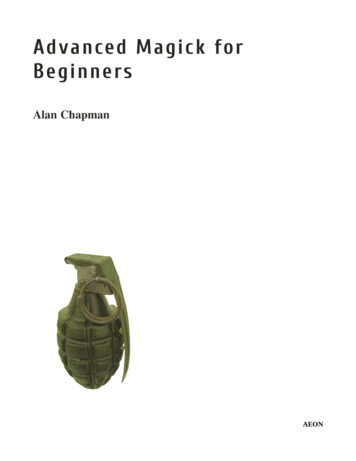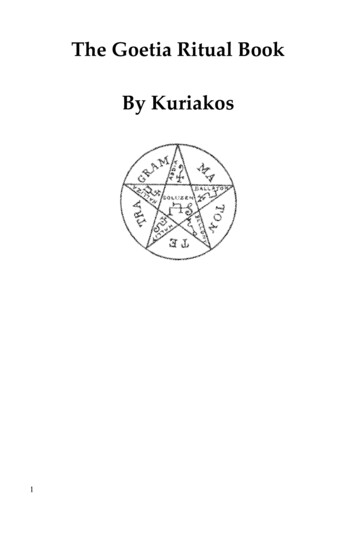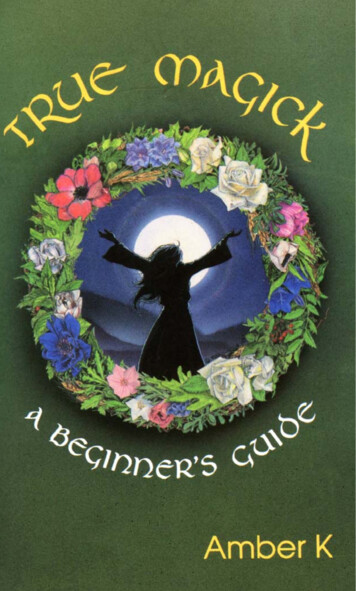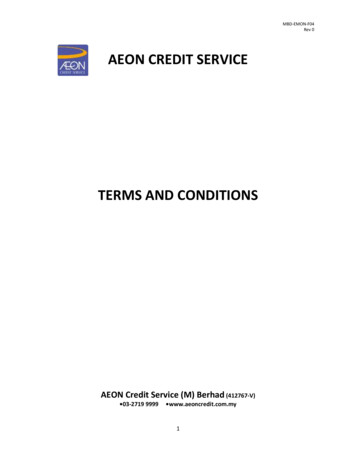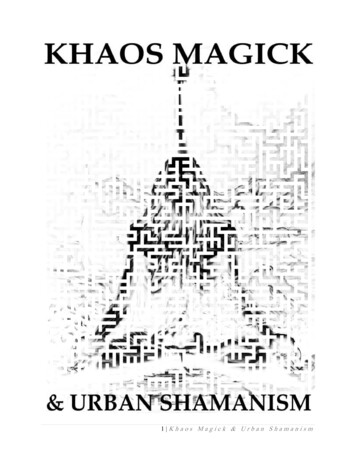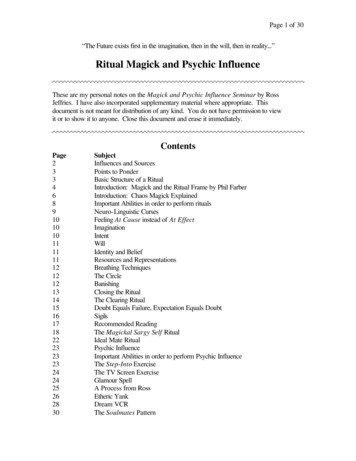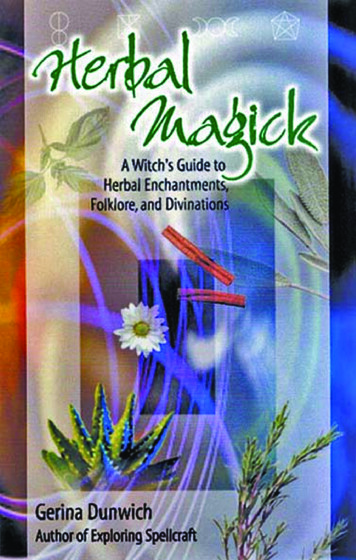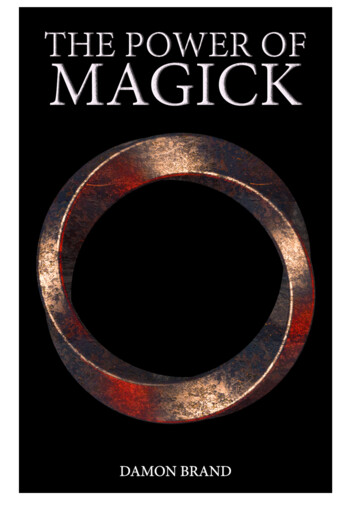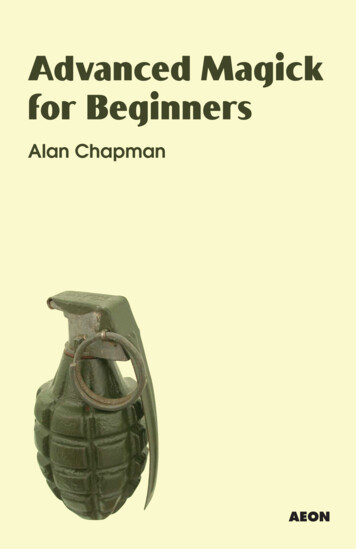
Transcription
Advanced Magickfor BeginnersbyAlan Chapman
First published 2008by Aeon Books Ltd.London W5www.aeonbooks.co.uk Alan ChapmanThe moral right of the author has been asserted.All rights reserved. No part of this book may be reproduced or untilised in any form or by any means, electronic or mechanical, without permission in writingfrom the publisher.British Library Cataloguing in Publication DataA C.I.P. is available for this book from the British Library.ISBN-13: 978-1-90465-841-2Printed and bound in Great Britain.
Om Gam.I bow to Ganapati.
CONTENTSACKNOWLEDGMENTS.7INTRODUCTION.91. NOTHING UP MY SLEEVE.152. ‘I AM EXTERNAL!’.233. RUB A SPONGE.294. IN THE BEGINNING WAS THE WORD.375. METHOD TO THE MADNESS.396. A MODEL MAGICIAN.517. WHAT’S IN A NAME?.578. GOT YOUR NUMBER.659. THE WORLD AS WE KNOW IT.7110. THE DIRTY F-WORD.8911. GOD BOTHERING.9312. ONE PORTION OF DEATH, PLEASE.10713. MAKING OMELETTES.12114. HOVER BOARDS AND SILVER LYCRA.13515. ABSEILING.14116. BUT SOMEONE WOULD HAVE TOLD ME!.15117. ROW YOUR BOAT.155RECOMMENDED READING.167
ACKNOWLEDGMENTSThis book is dedicated to my lazy chela, DuncanBarford.I would like to thank OR for the vision, Lord Ganesha for opening the way, Tezcatlipoca for taking aninterest, AC for the teachings, RAW for the handover, the BIS for the most fun I’ve had in my life,and the One True Body of Saints for all their loveand support.
INTRODUCTIONOR:‘THE PURPOSE OF THIS BOOK’Investigating the Western tradition of magick canbe confusing at the best of times, let alone for aperson who is at the beginning of their magicaljourney. There is the near-impenetrable transcendentalism of early twentieth-century magical texts,the moralistic environmentalism of the modern Pagan movement, the popular naive sentimentalityof the New Age and the almost cartoon-like practical materialism of some postmodern authors.Where are we supposed to look for a basic introduction to magick, when there doesn’t appear tobe a consensus on what magick is, let alone a reason for why we might want to practice it?However this confusion around the fundamental nature of magick is in itself a fairly recent development. Historically, magick has a very specificpurpose as a two-thousand-year-old sacred tradition peculiar to the West. Beginning in HellenisticGreece, where it was taught by the likes of Platoand Plotinus, it was absorbed into Christianity by9
10 ADVANCED MAGICK FOR BEGINNERSpseudo-Dionysius, then forced underground to become alchemy during the Dark Ages. It resurfacedthrough John Dee and Rosicrucianism in the sixteenth century, and later manifested as theEuropean occult revival of the nineteenth andtwentieth centuries. Over the years it has survivednear extinction through religious persecution anddeliberate misrepresentation. Today it has to contend with the rot of extreme postmodernism,which is the principal cause of the tradition’s current obfuscation.Postmodern thought is often misunderstood,and the concept of pluralism—the recognition ofmany contexts and the understanding that no onecontext is privileged in and of itself—is often confused with the absurd notion that every approach,culture and tradition is commensurate and ofequal merit. In terms of magick, the purpose andteachings of our magical heritage in the West hasbeen replaced with this extreme ethical standpoint,and some magicians even claim that the WesternTradition is actually a syncretic mish-mash of anyand all of the magical religions practiced in theWest. Is it any wonder we can’t find a basic consensus on what magick is?Thankfully, as inconvenient as extreme postmodernism may be, the truth of the matter doesn’trequire a democracy, nor is the Western Traditionsimply a body of work that requires recovery. Onthe contrary: direct, personal experience of its corepractice can teach us everything we need to know.Therefore the fresh perspective on magickpresented here is the result of over a decade’s per-
INTRODUCTION11sonal research, experiment and revelation. Thefundamental purpose and practice of magick is thesame as it ever was, and so although this work appears to offer a new paradigm it should be notedthat this is nothing more than a timely rejuvenation of the surface features of the Tradition,something which has already occurred periodicallythroughout magick’s long and troubled history.CHAOS MAGICThe publication of Peter Carroll’s Liber Null in 1978ushered in the last revolution in the surface features of magick, spawning a movement that eventually became known as ‘Chaos Magic1’. With itsemphasis on practicality and on looking at whatactually ‘works’, Liber Null was different to previous magical texts, in that for the first time a commonality of technique behind magical effects wasrevealed.However a subtle shift in focus came about as aresult of this experiment in reductionism. Magickbecame the technology of using belief as a tool,and any given world view could be commandeered to provide personal satisfaction for the postmodern magician.The influence of Chaos Magic has been pervasive, and present day occultism is essentially comprised of a handful of techniques endlessly recycled and translated by fame hungry ‘occult1. For more on Chaos Magic see Liber Null and Psychonaut andLiber Kaos by Peter Carroll; Condensed Chaos by Phil Hine; andChaotopia! by Dave Lee.
12 ADVANCED MAGICK FOR BEGINNERSstars’, who actually believe they are offering transformation for the masses. It is a testament to Carroll that these techniques can be found in the firstfive pages of Liber Null. It is also telling of wherereductionism has led magick when we see that therest of Liber Null (which covers topics such as ‘TheGreat Work’, morality, reincarnation and permanent ‘magical consciousness’) is no longer considered magick at all.Now, thirty years on, Chaos Magic (like muchof magical culture) has fallen prey to extreme postmodernism. The Tradition has degenerated to suchan extent that many of its practitioners now claimit is just a theory, despite the fact that it is clearlysynonymous with a body of work and an unquestionable aesthetic. Instead of attempting to understand magick by discovering what the practice hasto offer through experience, these extreme postmodern magicians deconstruct our rich and varied magical heritage to one correct answer (‘all truth is relative’—except for their omniscient knowledge thatthis is so) with the benefits of magical practice reduced to immediate material effect: ‘I already knoweverything magick has to offer—and anything elsethat isn’t a material result isn’t magick’.Before Chaos Magic came along the WesternTradition was in danger of being lost behind a wallof overly complex symbolism and antiquated morality, more or less existing as the pastime of ridiculous armchair eccentrics. Chaos Magic breathednew life into it, making it a practice once again,and this time in a manner accessible to all. Thecontribution of postmodern thought to Western
INTRODUCTION13magical culture should therefore be celebrated.Nevertheless, it is time to address the detriment ofextreme postmodernism. I hope this book will dothis through providing a new, revitalised expression of our magical heritage.THE NEXT BIG THINGToday, ‘occult’ no longer means ‘hidden’. The torture and murder of magicians is now quite low onthe government’s list of things to do. Although magick is still not accepted as a bone fide spiritualdiscipline by the media at large, the number ofpeople investigating it as a valid world view isevident from the steady growth of popular interestin dumbed-down versions of magical traditions,such as Rav Berg’s Kabbalah, or the proliferation ofpublished works by the ‘next generation’ of youngmagicians, where scholarship is considered inappropriate, sentimentalism rife and reasoningpower painfully absent. Yet this is not to bemourned; for the occult as a commodity—just likethe popularisation of alien abductions, the returnof Buddha and increasingly complex crop circles—is indicative of a growing trend towards a proliferation of magical thought in the public sphere, anda re-orientation of Western culture towards theesoteric.At present, magick may incur ridicule—this isclearly demonstrated through the embarrassmentfelt by the current occult scene towards the term itself. However this very embarrassment indicatesan increasing openness towards magical practice—
14 ADVANCED MAGICK FOR BEGINNERSsomething that has never occurred before on sucha scale. Some feel that calling it ‘a technology’saves their blushes, but this is an unnecessary exercise in finding public acceptance. Increasingly, theword ‘magick’ is being used more and more in itsoriginal sense. Ask yourself—do you think that ourforebears who were burnt at the stake would havebeen embarrassed to call themselves ‘magicians’?SIGNING ONMagick is now an opportunity for more peoplethan ever before.This book is a sign-post.
everything magick has to offer—and anything else that isn't a material result isn't magick'. Before Chaos Magic came along the Western Tradition was in danger of being lost behind a wall of overly complex symbolism and antiquated mor-ality, more or less existing as the pastime of ridicu-lous armchair eccentrics. Chaos Magic breathed
